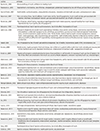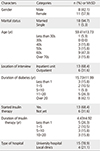Abstract
Purpose
The purpose of this study was to define the concept for psychological insulin resistance in the Korean population with diabetes.
Methods
The Hybrid model was used to perform the concept analysis of psychological insulin resistance. Results from both the theoretical review with 26 studies and a field study including 19 participants with diabetes were included in final process.
Results
The preceding factors of psychological insulin resistance were uncontrolled blood glucose and change in daily life. The concept of psychological insulin resistance was found to have three categories with 8 attributes such as emotional factors (negative feeling), cognitive factors (low awareness and knowledge, low confidence for self-injection) and supportive factors (economic burden, dependency life, embarrassing, feeling about supporters, feeling of trust in, vs mistrust of health care providers). The 8 attributes included 30 indicators.
Conclusion
The psychological insulin resistance of population with diabetes in Korea was defined as a complex phenomenon associated with insulin therapy that can be affected by emotional factors, cognitive factors, and supportive relational factors. Based on the results, a tool for measuring psychological insulin resistance of Koreans with diabetes and effective programs for enhancing insulin adherence should be developed in future studies.
Figures and Tables
Notes
References
1. Hong JS, Kang HC. Oral antihyperglycemic medication adherence and its associated factors among ambulatory care with adult type 2 diabetes patients in Korea. Korean J Health Policy Adm. 2010; 20(2):128–143. DOI: 10.4332/KJHPA.2010.20.2.128.
2. Korean Diabetes Association. Korean diabetes fact sheet 2013. Seoul: Author;2013.
3. Brod M, Kongsø JH, Lessard S, Christensen TL. Psychological insulin resistance: Patient beliefs and implications for diabetes management. Qual Life Res. 2009; 18(1):23–32. DOI: 10.1007/s11136-008-9419-1.
4. Peyrot M, Rubin RR, Lauritzen T, Skovlund SE, Snoek FJ, Matthews DR, et al. Resistance to insulin therapy among patients and providers: Results of the cross-national Diabetes Attitudes, Wishes, and Needs (DAWN) study. Diabetes Care. 2005; 28(11):2673–2679. DOI: 10.2337/diacare.28.11.2673.
5. Fu SN, Chin WY, Wong CK, Yeung VT, Yiu MP, Tsui HY, et al. Development and validation of the Chinese Attitudes to Starting Insulin Questionnaire (Ch-ASIQ) for primary care patients with type 2 diabetes. PloS One. 2013; 8(11):e78933. DOI: 10.1371/journal.pone.0078933.
6. Hong SH, Kim MJ, Noh SG, Suh DW, Youn SJ, Lee KW, et al. A study on resistance in type 2 diabetic patient against commencement of insulin treatment. J Korean Diabetes. 2008; 32(3):269–279. DOI: 10.4093/kdj.2008.32.3.269.
7. Petrak F, Stridde E, Leverkus F, Crispin AA, Forst T, Pfützner A. Development and validation of a new measure to evaluate psychological resistance to insulin treatment. Diabetes Care. 2007; 30(9):2199–2204. DOI: 10.2337/dc06-2042.
8. Polonsky WH, Fisher L, Guzman S, Villa-Caballero L, Edelman SV. Psychological insulin resistance in patients with type 2 diabetes: The scope of the problem. Diabetes Care. 2005; 28(10):2543–2555. DOI: 10.1016/s1751-9918(10)60004-6.
9. Peyrot M, Rubin RR, Khunti K. Addressing barriers to initiation of insulin in patients with type 2 diabetes. Prim Care Diabetes. 2010; 4:Suppl 1. S11–S18.
10. Lee EW. Self-injection related anxiety, fear and self-care compliance in insulin-treated diabetes patients [master's thesis]. Seoul: Ewha Womans University;2002. 1–69.
11. Larkin ME, Capasso VA, Chen CL, Mahoney EK, Hazard B, Cagliero E, et al. Measuring psychological insulin resistance: Barriers to insulin use. Diabetes Educ. 2008; 34(3):511–517. DOI: 10.1177/0145721708317869.
12. Nam S, Song HJ, Park SY, Song Y. Challenges of diabetes management in immigrant Korean Americans. Diabetes Educ. 2013; 39(2):213–221. DOI: 10.1177/0145721713475846.
13. Reach G, Le Pautremat V, Gupta S. Determinants and consequences of insulin initiation for type 2 diabetes in France: Analysis of the National Health and Wellness Survey. Patient Prefer Adherence. 2013; 7:1007–1023. DOI: 10.2147/ppa.s51299.
14. Schwartz-Barcott D, Kim HS. An expansion and elaboration of the hybrid model of concept development. In : Rodgers BL, Knafl KA, editors. Concept development in Nursing: Foundations, techniques, and applications. 2nd ed. Philadelphia, PA: W.B. Sanders;2000. p. 161–192.
15. Hsieh HF, Shannon SE. Three approaches to qualitative content analysis. Qual Health Res. 2005; 15(9):1277–1288. DOI: 10.1177/1049732305276687.
16. Strauss AL, Corbin JM. Basics of qualitative research: Techniques and procedures for developing grounded theory. Thousand Oaks, CA: Sage Publications;1998. p. 55–101.
17. National Institute of Korean Language. Basic Korean dictionary [Internet]. Seoul: Author;2015. cited 2015 March 1. Available from: http://stdweb2.korean.go.kr/search/List_dic.jsp.
18. Kang MR. Relationships among psychological insulin resistance diabetes knowledge and self-efficacy in patients with type 2 diabetes [master's thesis]. Seoul: Yonsei University;2014. 1–71.
19. Gherman A, Veresiu IA, Sassu RA, Schnur JB, Scheckner BL, Montgomery GH. Psychological insulin resistance: A critical review of the literature. Pract Diabetes Int. 2011; 28(3):125d–128d. DOI: 10.1002/pdi.1574.
20. Farsaei S, Radfar M, Heydari Z, Abbasi F, Qorbani M. Insulin adherence in patients with diabetes: Risk factors for injection omission. Prim Care Diabetes. 2014; 8(4):338–345. DOI: 10.1016/j.pcd.2014.03.001.
21. Machinani S, Bazargan-Hejazi S, Hsia SH. Psychological insulin resistance among low-income, U.S. racial minority patients with type 2 diabetes. Prim Care Diabetes. 2013; 7(1):51–55. DOI: 10.1016/j.pcd.2012.11.003.
22. Brunton S. Insulin delivery systems: reducing barriers to insulin therapy and advancing diabetes mellitus treatment. Am J Med. 2008; 121:6 Suppl. S35–S41. DOI: 10.1016/j.amjmed.2008.03.025.
23. Makine C, Karşidağ C, Kadioğlu P, Ilkova H, Karşidağ K, Skovlund SE, et al. Symptoms of depression and diabetes-specific emotional distress are associated with a negative appraisal of insulin therapy in insulin-naive patients with Type 2 diabetes mellitus. A study from the European Depression in Diabetes [EDID] Research Consortium. Diabet Med. 2009; 26(1):28–33. DOI: 10.1111/j.1464-5491.2008.02606.x.
24. Abu Hassan H, Tohid H, Mohd Amin R, Long Bidin MB, Muthupalaniappen L, Omar K. Factors influencing insulin acceptance among type 2 diabetes mellitus patients in a primary care clinic: A qualitative exploration. BMC Fam Pract. 2013; 14:164. DOI: 10.1186/1471-2296-14-164.
25. Polonsky WH, Anderson BJ, Lohrer PA, Welch G, Jacobson AM, Aponte JE, et al. Assessment of diabetes-related distress. Diabetes Care. 1995; 18(6):754–760. DOI: 10.2337/diacare.18.6.754.
26. Snoek FJ, Skovlund SE, Pouwer F. Development and validation of the insulin treatment appraisal scale (ITAS) in patients with type 2 diabetes. Health Qual Life Outcomes. 2007; 5:69. DOI: 10.1186/1477-7525-5-69.
27. Karter AJ, Subramanian U, Saha C, Crosson JC, Parker MM, Swain BE, et al. Barriers to insulin initiation: The translating research into action for diabetes insulin starts project. Diabetes Care. 2010; 33(4):733–735. DOI: 10.2337/dc09-1184.




 PDF
PDF ePub
ePub Citation
Citation Print
Print






 XML Download
XML Download